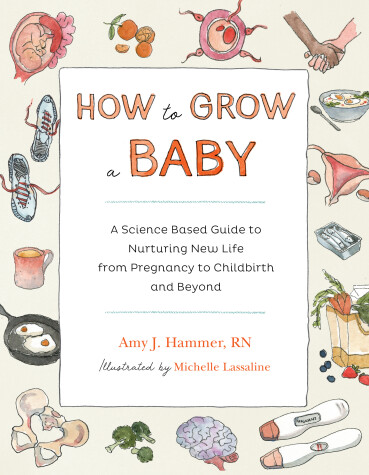
annieb123
Written on Jun 21, 2021
How to Grow a Baby is a layman accessible clearly explained guide to pregnancy and childbirth written by Amy J. Hammer. Due out 21st Sept 2021 from Roost Books, it's 240 pages and will be available in paperback format.
This is an informative and comforting science-based book on conception, pregnancy, birth, and post-partum recovery/family planning. The chapters are arranged thematically and chronologically around a successful conception and pregnancy. Although it's not an academic work, there are meticulous and abundant annotations provided throughout. The chapter notes and bibliography are full of links for more comprehensive reading for especially curious readers.
The illustrations are clear and understandable and the models represent a wide variety of skin tones. The text throughout is thoughtful and respectful with regard to gender and identity referring often to "birthing parent" and "sperm-contributing parent" as well as adding "chestfeeding" where "breastfeeding" also occurs. Outside of those forward-thinking and inclusive adaptations (which are positive and a good thing) the rest of the book stays far far away from any undesirable outcomes more serious than vitamin D deficiency and to avoid stress. There's no discussion of miscarriage, IVF or infertility (except for some vague talk of sperm motility and counts), stillbirth, or maternal death. It's obviously outside the scope of this book (which is to reassure expectant parents and their partners who are unsure what to expect), but having experienced stillbirth myself, I can't help thinking that despite the vanishingly slim *chance* of it happening even in industrialized nations, it *does* happen and some sort of acknowledgement of the fact would be a comfort to those few of us who are so unlucky as to have experienced it.
This is an updated guide with updated and inclusive language on what to expect from pregnancy, childbirth, and recovery. I also liked that the author made a point of saying "There is no ranking or hierarchy connected to how we birth. What matters is that we feel empowered and that we’re given every opportunity to bond with our babies". So having a C-section absolutely doesn't mean you "failed" in any way, and it's nice to see a healthcare professional saying it in black and white.
Four stars. This would be a good choice for library acquisition, people trying to conceive, or for an expectant parent.
Disclosure: I received an ARC at no cost from the author/publisher for review purposes.
